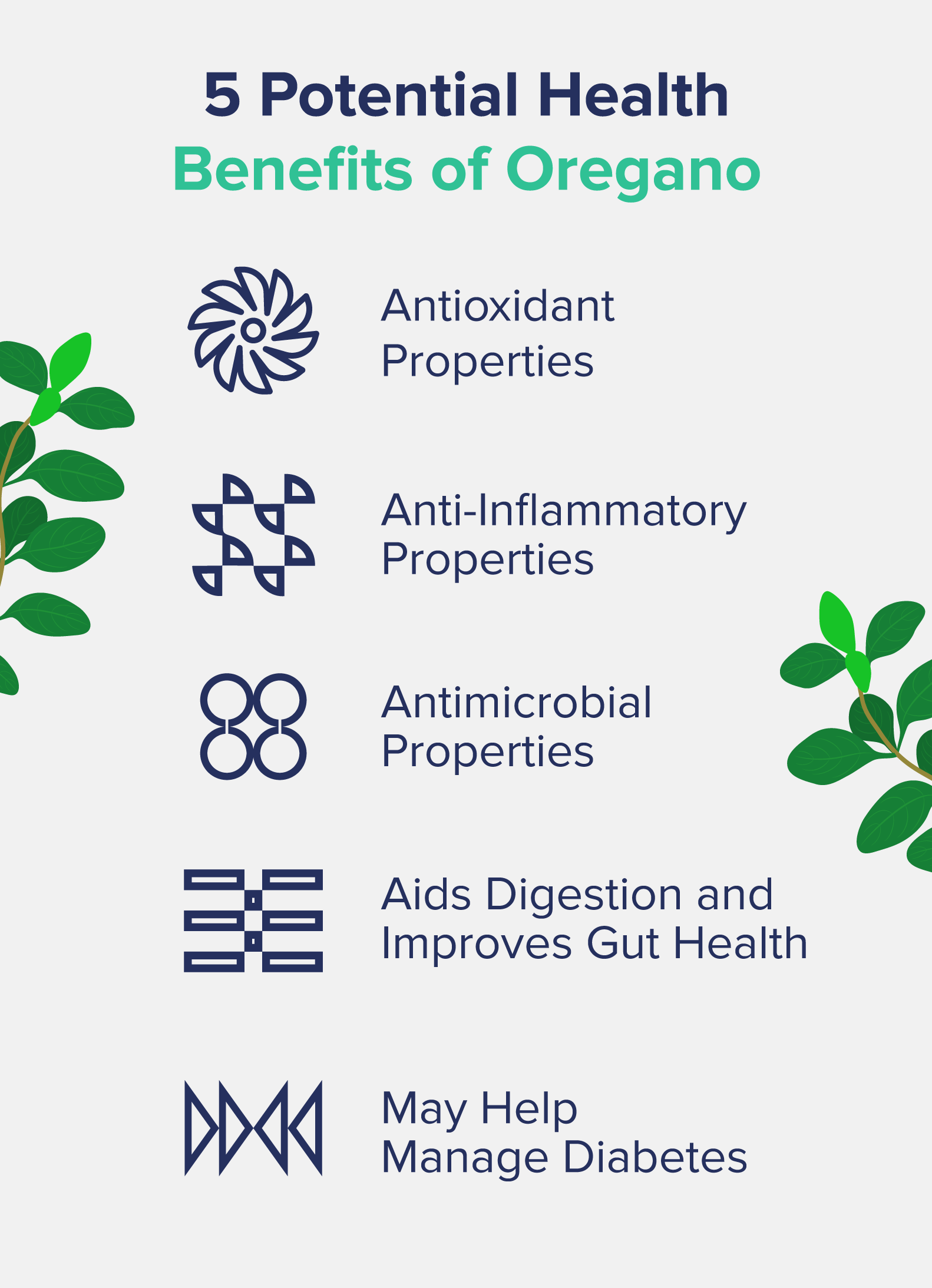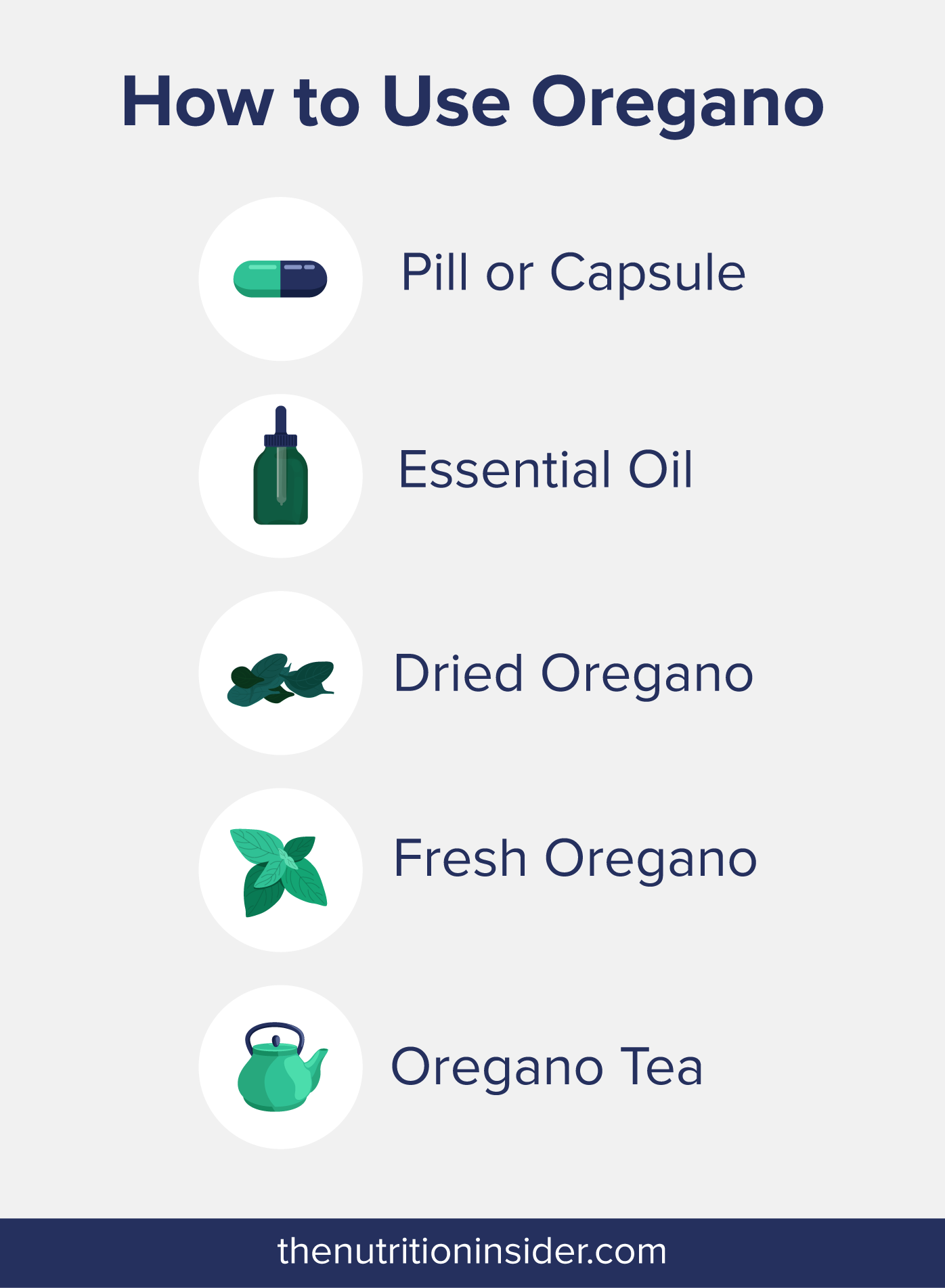Talk to a Registered Dietitian and use INSIDER20 for 20% off!
Talk to a real Dietitian for only $99: Schedule Now
This post contains links through which we may earn a small commission should you make a purchase from a brand. This in no way affects our ability to objectively critique the products and brands we review.
Evidence Based Research To fulfill our commitment to bringing our audience accurate and insightful content, our expert writers and medical reviewers rely on carefully curated research.
Read Our Editorial Policy
Are our spice cabinets the new medicine cabinet?
Many herbs and spices in our kitchens are said to have healthful, even restorative properties.
But is oregano one of them?
While it’s mainly known for giving our pasta sauces a little extra pizazz, oregano also contains antioxidants and two naturally occurring phenols, carvacrol and thymol, that may have antimicrobial properties.
So, the answer could be yes!
Studies show oregano may have several health benefits that can reduce inflammation, support healthy digestion, and help our immune systems fight infections.
And that’s just scratching the surface of what this little leaf is claimed to do.
Oregano (Origanum vulgare), also known as Spanish thyme or wild marjoram, has been used as a medicinal herb since ancient times.
The Greeks and Romans used the leaves as an antiseptic to treat skin ailments, asthma, and other digestive issues.
In the modern era, oregano has been the focus of many research studies looking into its potential medicinal properties. Here’s what they’ve found.

Oregano is rich in three polyphenol compounds—rosmarinic acid, carvacrol, and thymol. In general, plant-derived polyphenols are known to have excellent antioxidant properties and health benefits.
A study of the polyphenol content of oregano extract found that the levels of polyphenols present were enough to prevent oxidative stress in the body by scavenging free radicals (unstable atoms that can damage human cells).
Oxidative stress can cause inflammation, worsen signs of aging, and lead to various other health conditions.
In this study, the researchers also noted two crucial factors:
1) The amount of dried oregano leaves used was far less than typically consumed in the Mediterranean Diet.
2) The extraction methods used were similar to the process that dried oregano would go through in normal cooking conditions
The implication here is that you could easily reap the antioxidant benefits of oregano with frequent consumption of it.
Thanks to the antioxidant phenols present in oregano, this plant’s other claim to fame is its anti-inflammatory properties.
In particular, studies show carvacrol’s anti-inflammatory abilities could protect against digestive and oral diseases, improve pain caused by inflammation, and reduce seasonal allergy symptoms.
However, it’s important to note that most existing research uses concentrated oregano oil or essential oil on animal test subjects.
So, if you’re a human reading this, don’t count on getting the same anti-inflammatory benefits from ingesting dried or fresh oregano a few times a week with dinner.
Essential oregano oil has been widely studied for its antimicrobial properties, particularly for use in agricultural settings and food preservation to prevent the growth of harmful bacteria.
Some studies show oregano oil can also fight off viral, bacterial, and fungal infections in humans and animals and improve wound healing.
A few studies have even shown that the antibacterial properties of oregano oil are particularly effective in inhibiting the serious skin infection Methicillin-resistant Staphylococcus aureus, better known as MRSA.
However, these studies have been done in vitro (in lab settings outside of living organisms), so we wouldn’t recommend rubbing oregano essential oil on an infected wound. It’s still best to see a doctor first.
However, per a first-of-its-kind in vivo study, oregano oil’s use as a natural antibacterial does have implications for use in clinical settings to combat multi-drug-resistant microbes. ‘Another study concludes that oregano oil may have antiviral properties and can be a surface disinfectant for human norovirus.
Our gut health influences the proper function of our immune systems, mental health, sleep quality, hormone balance, and athletic performance.
As a result, chronic diseases such as irritable bowel syndrome and Crohn’s disease can seriously impact a person’s quality of life.
In traditional medicine, oregano oil is used to treat digestive problems such as indigestion, diarrhea, and upset stomach. Several studies have proven there is, in fact, a link between oregano oil and its ability to support our gut health, including inhibiting small intestine bacterial overgrowth (SIBO) and Helicobacter pylori bacteria (which can cause gastritis) and killing intestinal parasites.
Oregano oil can lower blood sugar levels, increase insulin sensitivity, and partially reverse some symptoms of diabetes in animal studies.
More research and human studies are required to understand the full breadth and depth of oregano benefits for diabetes management, but the current results are promising. Do not take oregano oil or extracts if you currently take drugs that lower your blood glucose levels. There is a potential that it can reduce your blood sugar levels too low and cause hypoglycemia.
Oregano is primarily used in the kitchen to flavor sauces, stews, and other hearty dishes.
However, it’s also used as a medicinal herb either in the form of oregano oil, oregano essential oil, fresh or dried leaves, and even as a tea.
Remember, regardless of its purported benefits, oregano in any form is no replacement for prescribed medications.
So, speak to your doctor before taking any oregano supplements.

You may come across a few different terminologies when searching for an oregano supplement: oil of oregano, oregano oil, and oregano essential oil.
Oil of oregano and oregano oil are essentially the same and come in pill or capsule form or as a tincture.
This form of oregano is made by extracting the plant’s beneficial compounds (such as carvacrol, thymol, and rosmarinic acid) using alcohol or carbon dioxide.
Per manufacturer recommendations, oregano oil should be taken with food to improve absorption and avoid any potential stomach upset.
Oregano essential oil is different from the oil of oregano.
This essential oil is created by taking the oregano plant’s leaves, stems, or flowers and using steam distillation to extract the beneficial oils.
Oregano essential oil is the most widely studied form of oregano extract and is high in carvacrol and thymol, oregano’s two most beneficial compounds.
However, you should not consume any plant extracts in this form orally, and you should always dilute essential oils. Undiluted oregano oil can cause skin irritation.
Mix oregano essential oil with a carrier oil of your choice, such as olive oil, avocado oil, almond oil, etc.
Of course, you can always just add more dried and fresh oregano to your diet.
Mediterranean recipes like Italian, Greek, and Spanish dishes use oregano. But don’t be afraid to experiment with it a little and try it in some of your other favorite meals!
This form won’t be as potent as oregano oil and essential oils, but adding more to your diet never hurts.
Oregano tea has been used throughout the Mediterranean and Eastern Europe as a traditional medicine to treat everything from sore throats and digestive issues to headaches and even toothaches.
While oregano belongs to the mint family, the tea has a more peppery flavor, which some also describe as earthy.
It’s considered pretty light, but if the flavor is too bitter, add fewer leaves with your next brew or combine it with another tasty herb like peppermint to make it more palatable.
Now, no clinical human studies have tested either the efficacy or effects of oregano tea, but that doesn’t mean it couldn’t work.
You may experience some potential benefits of oregano… or you may not. But there’s no harm in drinking it for most people, so why not give it a try?
Oregano in all its forms is generally safe and shouldn’t cause digestive issues.
However, if you consume a high amount of oregano or the essential oil, you may experience some adverse side effects, including:
Oregano essential oil can also cause skin irritation if undiluted.
Always follow the directions on the product label with any form of oregano supplement or extract.
Oregano (Origanum vulgare) is high in the polyphenols carvacrol, thymol, and rosmarinic acid.
These compounds have antioxidant properties that can have anti-inflammatory effects on the body.
Oregano extracts such as oregano essential oil are a scientifically proven natural bactericide that can kill surface microbes and viruses, inhibit fungal infections and overgrowth of bacteria in the gut, treat skin infections, improve wound healing, lower blood sugar levels, and improve insulin reactivity.
Oregano is one of the most widely studied herbs, with researchers looking into its potential health benefits for various illnesses and health issues.
However, most research has been done in vitro (in lab settings outside of living organisms) and in animal studies.
More research is needed, especially on humans, to determine whether oregano extract can have clinical benefits.
Currently, oregano essential oil is well-documented as having bactericidal effects and can be used as a natural surface disinfectant. However, it is not recommended to consume orally in this form.
If you want to take oregano supplements to naturally improve your gut health or support your immune system in fighting off infections, there is evidence that it could help.
Oregano does not impact the human body in the same way as prescription medications.
However, oregano might slow blood clotting and cause lower blood sugar levels.
So, if you take any blood thinners, blood coagulants, or diabetes medications, consult your doctor before taking any oregano supplements.
Undiluted oregano essential oil can cause skin irritation and, if ingested, can have a toxic effect.
Check out these guidelines for Diluting Essential Oils from Now Foods that explain how to dilute essential oils properly.
No, oregano does not detox the body. While there are some plants that can support our body’s natural detoxification pathways, oregano is not one of them. But that’s okay because the human body is an incredible detox machine! Our kidneys and liver are great at filtering toxins from the bloodstream
There is no recommended daily dose for oregano.
Regularly consuming fresh or dried leaves is perfectly fine and can even be a part of a healthy diet.
If you take oregano supplements in the form of oregano oil contained in pills or capsules, follow the manufacturer’s advice on the label.
Never consume oregano essential oil, and always dilute it when applying it topically. Again, follow the advice on the label and be mindful of how much and how often you use it.
Always ask your doctor when adding new supplements to your diet, as oregano can interact with certain medications.